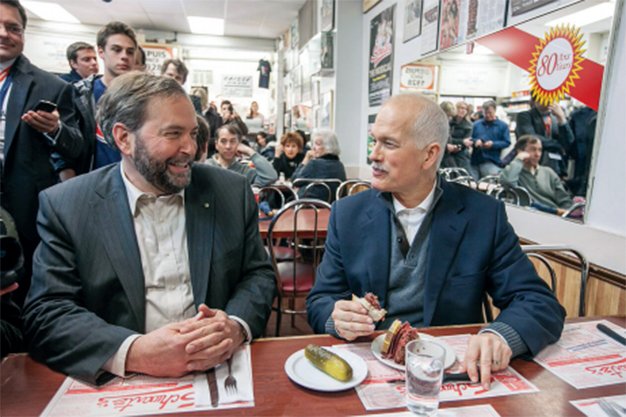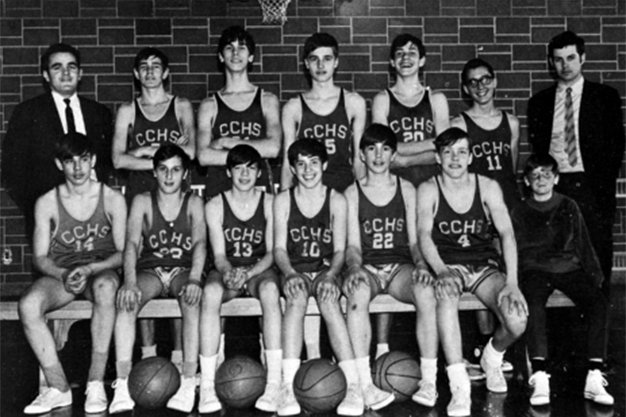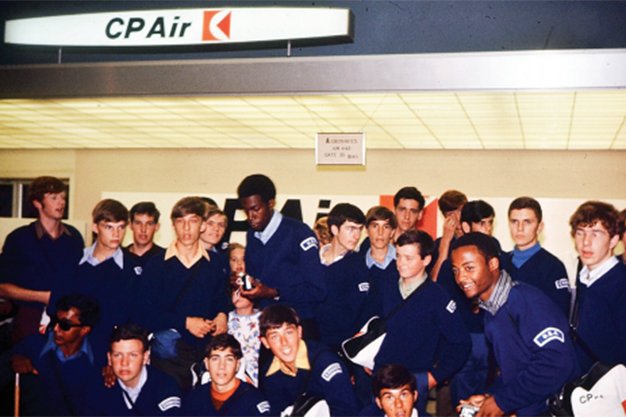
The year was 1968, my second at Chomedey High. The Vietnam War was at its height. On college and university campuses throughout Canada, the U.S., and Europe, student sit-ins and occupations were commonplace. In our school, the most revolutionary change was that religion classes had been replaced by an ethics course. It seemed like a small step forward compared to what was happening all around us in those tumultuous times, but the course turned out to be engaging and interesting. Our teacher was an American draft dodger with a unique perspective on the world we lived in.
Our high school had a very strict regimen, but one day my classmate John McMaster and I and some other kids boldly led a walkout to challenge what we saw as a grave injustice. We marched down to the basement of the annex building where the grade eight and nine classrooms were located. Then we staged a sit-in and refused to go back to our books until this outrage had been rectified. The school had taken away our recess, for whatever reason, and we weren’t going to stand for it. Much to our surprise and satisfaction, our sit-in worked. The administration caved and reversed its decision, and we got our recess back. It was amid this heady atmosphere of student empowerment that we learned a new instructor was coming to teach some of our second year classes — a Catholic priest. A priest? In high school? It seemed like a step backwards. We were completely unprepared for the social and intellectual whirlwind that was about to hit us in the form of Father Alan Cox.
Father Alan Cox was in his early thirties and had already distinguished himself by working with the police to help street kids in Montréal. He had known Father Emmett Johns, who was called “Pops” on downtown streets, since the 1960s, and was cut from the same cloth. In those days they were both working with runaways and drug-addicted kids downtown, long before Johns would eventually establish Le Bon Dieu dans la Rue (now simply called Dans la Rue), a renowned charitable organization helping homeless youth. Father Cox’s transfer to Laval was a godsend for me, but it wasn’t until much later that I learned the real reason he had been sent there. Father Cox had been forced to come to Chomedey after the archdiocese declared that his ministering to street kids was unbecoming of a man of the cloth. For caring for the least among us, Father Cox was, quite literally, banished from the city to what the archdiocese probably hoped would be a quiet tenure in a sleepy, suburban parish. They would have no such luck.
When the decision had come down from the archdiocese to move Father Cox, he had been working in LaSalle, where an explosion and a fire in an apartment building had killed dozens of people. Father Cox had been working with the police and firemen to help the traumatized survivors, most of whom were poor and without insurance, to deal with the aftermath. When the archdiocese had first directed him to go to Laval he’d wanted nothing to do with it, but in the end he reconciled himself to the prospect and did what he was asked. What was a difficult time for Father Cox became a life-changing event for me. He arrived at our school in a vehicle that became known ever after as “the Coxmobile.” Because he was very close to both the Montréal fire service, as a result of his help with survivors of the LaSalle disaster and of his chaplaincy work, and the police force, for his work with young people in conflict with the law, in order to thank him and to facilitate their continued work together, he’d been given an unmarked patrol car as his personal vehicle. It was replete with two-way radio and had the muscle-car engine of the Chrysler products of that era (it was a Dodge). Needless to say, we were suitably impressed.
Father Cox was a brilliant, tough, and extraordinarily determined teacher, and he had an equally tough message for us, his students: “Get off your duffs and learn to play a positive role in society. There’s a lot of injustice out there that you need to be aware of. What’s more, you need to do something about it.” His message was grounded in the Gospel and the message of Jesus Christ, especially the Sermon on the Mount, but also anchored in the modern world. This was completely new to us, who’d grown up in a place where the Church reigned supreme and Mass — until recently — had been conducted exclusively in Latin. When Father Cox began saying Mass at our school, instead of finding any excuse not to attend, students started showing up in droves.
His homilies were calls to action. Father Cox challenged us. He inspired us. Sometimes he drove us nuts. He had what’s called a vocation, especially for working with young people. We formed a youth group, which we called Paladin. When we met in the evenings, Father Cox would show us a film — for example, about motorcycle gangs — and then have a conversation with us, inviting us to express our opinions and debate what we’d seen. That kind of critical thinking wasn’t part of the curriculum in many schools in those days, but Father Cox insisted on it. If Father Cox sensed that a student was telling him something because he thought it was what he wanted to hear, he didn’t like it. At times he chided us for being part of a generation whose minds were going to mush from watching too much television. At other times he spoke with such hope for us all. He encouraged us to learn about the world, to read voraciously — he was incredibly well read — to get involved and make a difference in what was going on around us.
The year before, while he was still teaching in LaSalle, he’d organized a trip to Europe for the students in his charge. He wanted to do the same for our high school. It all sounds easy now. A trip to Europe — big deal, you might say. But in those days, for us, a bunch of wet-behind-the-ears fourteen-year-olds who’d never been more than fifty kilometres from our quiet suburban homes, it was unimaginably bold, adventurous, unheard of. Father Cox wanted us to understand what a big, wide world we were a part of.
For our parents, the trip was such a daunting prospect that it required many meetings at the school and individual visits by Father Cox to convince them to let us go. He sat down with Mom and Dad and explained what the trip was about, adding that the only requirement was that we get summer jobs and earn the money to pay for it. My parents were very open-minded, and Dad, who was particularly hard to impress, took an immediate shine to Father Cox he especially approved of the condition that I come up with the money to pay for the trip. Recently, Alain Godbout, one of my high-school classmates on that trip, gave me his own copy of the original brochure that Father Cox had run off for our parents, showing the itinerary and the cost of the trip. When I opened it I couldn’t believe my eyes. Our airfares for two transatlantic flights and eight more within Europe came to a grand total of $282. Thank you, Alain, for that priceless gift, and for holding onto it all these years.
Our group landed in Lisbon, Portugal, where, jet-lagged as we were after our all-night flight from Canada, we immediately got on a train for Fatima. There we walked all day and were received at a convent for a meal that our very Canadian palates found exotic beyond belief. It included a fish with its tail in its mouth on each of our plates. We were even allowed a small glass of wine. The group went back to our hotel, which surprisingly was called York House, where we were bunked four or six to a room and thought that it was the lap of luxury. We were on cloud nine, unaware that our trip was about to be marred by tragedy.
Early the next morning, after our first night in Fatima, we were woken up and asked to go immediately downstairs for a meeting. We quickly got up and were taken to a room, wondering what this was about. Father Cox came in. He didn’t look well at all the other adults looked miserable. Something was terribly wrong, but we couldn’t imagine what it could be. Father Cox spoke. The night before, while hanging clothes on a line outside his window, Gary, one of our classmates, had slipped and fallen out of the window, hitting some wires on the way down. He had been killed instantly.
From Strength of Conviction by Tom Mulcair with permission from Dundurn Press. Tom Mulcair will be at Daniels Spectrum (585 Dundas East) at 10 am Monday, August 10 for the official launch of his book.
news@nowtoronto.com | @nowtoronto














